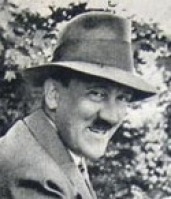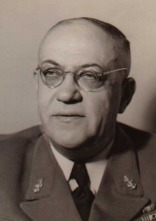Mind of the Fuhrer
Understanding the Mind of Hitler: His point of View

('smiling-hitler.')
In the amazingly insightful text of Mein Kampf written after Hitler was arrested for the The Beer Hall Putsch. He describes his life, his views (both personal and political), and his dreams. Some of the quotes listed below will describe Hitler's mind before the war, and I think you will find all of the quotes may be similar to some of the things we think or how we think. Whether we agree with him or not, you will find that the strength bound within these words contain the same power that we feel when we open our hearts and minds and form feelings into words, and the power of words was definitely a gift of the Fuhrer.
"Anyone is an upstart who rises by his own efforts from his previous position in life to a higher one. Ultimately this struggle, which is often hard, kills all pity. Our own painful struggle for existence destroys our feeling for the misery of those who have remained behind." ("Mein Kampf," pg. 23)
[On the condition of Vienna in 1923) "The reason for this hostility...lies in the fear of a social group, which has but recently raised itself above the level of the manual worker, that it will sink back into the old despised class, or at least become identified with it." ("Mein Kampf," pg. 23)
(Similar to Milwaukee) "Dazzling riches and loathsome poverty alternated sharply, with all the dubious magic of the national melting pot." ("Mein Kampf," pg. 23)
"The deepest sense of social responsibility for the creation of better foundations for out development, coupled with brutal determination in breaking down incurable tumors." (Mein Kampf," pg. 29)
"Social activity must never and on no account be directed toward philanthropic flim-flam, but rather toward the elimination of the basic deficiencies in the organization of our economic and cultural life that must - or on all events can - lead to the degeneration of the individual." (Mein Kampf," pg. 30)
"The question of the 'nationalization' of a people is, among other things, primarily a question of creating healthy social conditions as a foundation for the possibility of educating the individual." (Mein Kampf," pg. 34)
"Any man who wants to be a cowardly slave can have no honor, or honor itself wold soon fall into general contempt." ("Mein Kampf," pg. 177)
"In war, it lies in the brevity of the operation, and that means that the most aggressive fighting technique is the most humane." ("Mein Kampf," pg. 178)
[On Jews] "Their whole existence is an embodied protest against the aesthetics of the Lord's image." ("Mein Kampf," pg. 178)
[On the National Socialist German Workers Party] "Yes, indeed, we are trying to make up for what you in your criminal stupidity failed to do...You helped drag the nation into the abyss,; but we, in the form of attack and by setting up a new philosophy of life...and defending its principles, shall build for our people the steps on which it will some day climb back into the temple of freedom." ("Mein Kampf," pg. 378)
"A philosophy can only be organizationally comprehended on the basis of a definite formulation of that philosophy, and what dogmas represent for religious faith, party principles are for a political party in the making." ("Mein Kampf," pg. 384)
"The National Socialist German Workers Party takes over the essential fundamental traits....forms a political creed which, in turn, by the strict organizational integration of large human masses thus made possible, creates the precondition for the victorious struggle of this world view." ("Mein Kampf," pg. 385)
"Anyone is an upstart who rises by his own efforts from his previous position in life to a higher one. Ultimately this struggle, which is often hard, kills all pity. Our own painful struggle for existence destroys our feeling for the misery of those who have remained behind." ("Mein Kampf," pg. 23)
[On the condition of Vienna in 1923) "The reason for this hostility...lies in the fear of a social group, which has but recently raised itself above the level of the manual worker, that it will sink back into the old despised class, or at least become identified with it." ("Mein Kampf," pg. 23)
(Similar to Milwaukee) "Dazzling riches and loathsome poverty alternated sharply, with all the dubious magic of the national melting pot." ("Mein Kampf," pg. 23)
"The deepest sense of social responsibility for the creation of better foundations for out development, coupled with brutal determination in breaking down incurable tumors." (Mein Kampf," pg. 29)
"Social activity must never and on no account be directed toward philanthropic flim-flam, but rather toward the elimination of the basic deficiencies in the organization of our economic and cultural life that must - or on all events can - lead to the degeneration of the individual." (Mein Kampf," pg. 30)
"The question of the 'nationalization' of a people is, among other things, primarily a question of creating healthy social conditions as a foundation for the possibility of educating the individual." (Mein Kampf," pg. 34)
"Any man who wants to be a cowardly slave can have no honor, or honor itself wold soon fall into general contempt." ("Mein Kampf," pg. 177)
"In war, it lies in the brevity of the operation, and that means that the most aggressive fighting technique is the most humane." ("Mein Kampf," pg. 178)
[On Jews] "Their whole existence is an embodied protest against the aesthetics of the Lord's image." ("Mein Kampf," pg. 178)
[On the National Socialist German Workers Party] "Yes, indeed, we are trying to make up for what you in your criminal stupidity failed to do...You helped drag the nation into the abyss,; but we, in the form of attack and by setting up a new philosophy of life...and defending its principles, shall build for our people the steps on which it will some day climb back into the temple of freedom." ("Mein Kampf," pg. 378)
"A philosophy can only be organizationally comprehended on the basis of a definite formulation of that philosophy, and what dogmas represent for religious faith, party principles are for a political party in the making." ("Mein Kampf," pg. 384)
"The National Socialist German Workers Party takes over the essential fundamental traits....forms a political creed which, in turn, by the strict organizational integration of large human masses thus made possible, creates the precondition for the victorious struggle of this world view." ("Mein Kampf," pg. 385)
The Psychology of Hitler
Much research has been done to come to a final diagnosis of Hitler's psychology. However, an official diagnosis of the time has never been found. There are several factors in this situation. First, in order to make a scientific diagnosis to the current standards of today's psychology, Hitler would have to be alive. A psychologist has to see it from their own eyes to make honest observations. Second, even if Hitler did see an administered and experienced psychologist during his time and a diagnosis would have been made, the diagnosis would not have been released due to his position as chancellor and Fuhrer. The documents would have been burned. Also, the diagnosis made would likely be incorrect due to many changes that have taken place through time in this particular field. As a result, the following will not give you an official diagnosis, but you will learn of some things that will have affected the Mind of the Fuhrer.
~Dr. Morell's Involvement as Hitler's Physician

Dr. Morell ('Google')
Oxycodone, an Opiate
Prescribed oxycodone by injection during this time for severe intestinal spasms, but it is likely that Morell did not inform Hitler what he was being prescribed to. Hitler showed no withdrawal symptoms, and therefore was not addicted to the drug ("Redlich," pg. 238).
-Some Physical effects of this drug include constipation, fatigue, dizziness, nausea, head rushes, headache, dry mouth, frequent itching, and perspiration. Some withdrawal symptoms include insomnia, mood swings, and shaking, however, Hitler demonstrated none of these ("Oxycontin").
Barbiturates
Hitler, shortly after his exposure to Oxycodone, was prescribed barbiturates for consistent insomnia. However, Hitler often declined the use, and as a result no withdrawal symptoms were noted. I would also like to add that current research shows that the use of barbiturates is not only ineffective, but dangerous and can result in death ("Redlich," pg. 238).
-Some psychological symptoms of the use of barbiturates include drowsiness, depression, difficulty thinking, and emotional liability. Also, some neurological symptoms which occur are slurred speech, abnormal eye twitching and movement, and involuntary muscle movements ("Redlich," pg. 238).
Cocaine
From the end of August until October of 1944, Hitler was prescribed 1% cocaine solution for alleged inflammation of his maxillary sinus. No withdrawal symptoms were noted ("Redlich," pg. 239).
-Some symptoms of this drug are a rapid heart rate, high blood pressure, insomnia, myoclonus (muscle twitches), and permanent myocardial damage ("Redlich," pg. 239).
More research will be done later on and this site will be updated in the future.
Prescribed oxycodone by injection during this time for severe intestinal spasms, but it is likely that Morell did not inform Hitler what he was being prescribed to. Hitler showed no withdrawal symptoms, and therefore was not addicted to the drug ("Redlich," pg. 238).
-Some Physical effects of this drug include constipation, fatigue, dizziness, nausea, head rushes, headache, dry mouth, frequent itching, and perspiration. Some withdrawal symptoms include insomnia, mood swings, and shaking, however, Hitler demonstrated none of these ("Oxycontin").
Barbiturates
Hitler, shortly after his exposure to Oxycodone, was prescribed barbiturates for consistent insomnia. However, Hitler often declined the use, and as a result no withdrawal symptoms were noted. I would also like to add that current research shows that the use of barbiturates is not only ineffective, but dangerous and can result in death ("Redlich," pg. 238).
-Some psychological symptoms of the use of barbiturates include drowsiness, depression, difficulty thinking, and emotional liability. Also, some neurological symptoms which occur are slurred speech, abnormal eye twitching and movement, and involuntary muscle movements ("Redlich," pg. 238).
Cocaine
From the end of August until October of 1944, Hitler was prescribed 1% cocaine solution for alleged inflammation of his maxillary sinus. No withdrawal symptoms were noted ("Redlich," pg. 239).
-Some symptoms of this drug are a rapid heart rate, high blood pressure, insomnia, myoclonus (muscle twitches), and permanent myocardial damage ("Redlich," pg. 239).
More research will be done later on and this site will be updated in the future.
